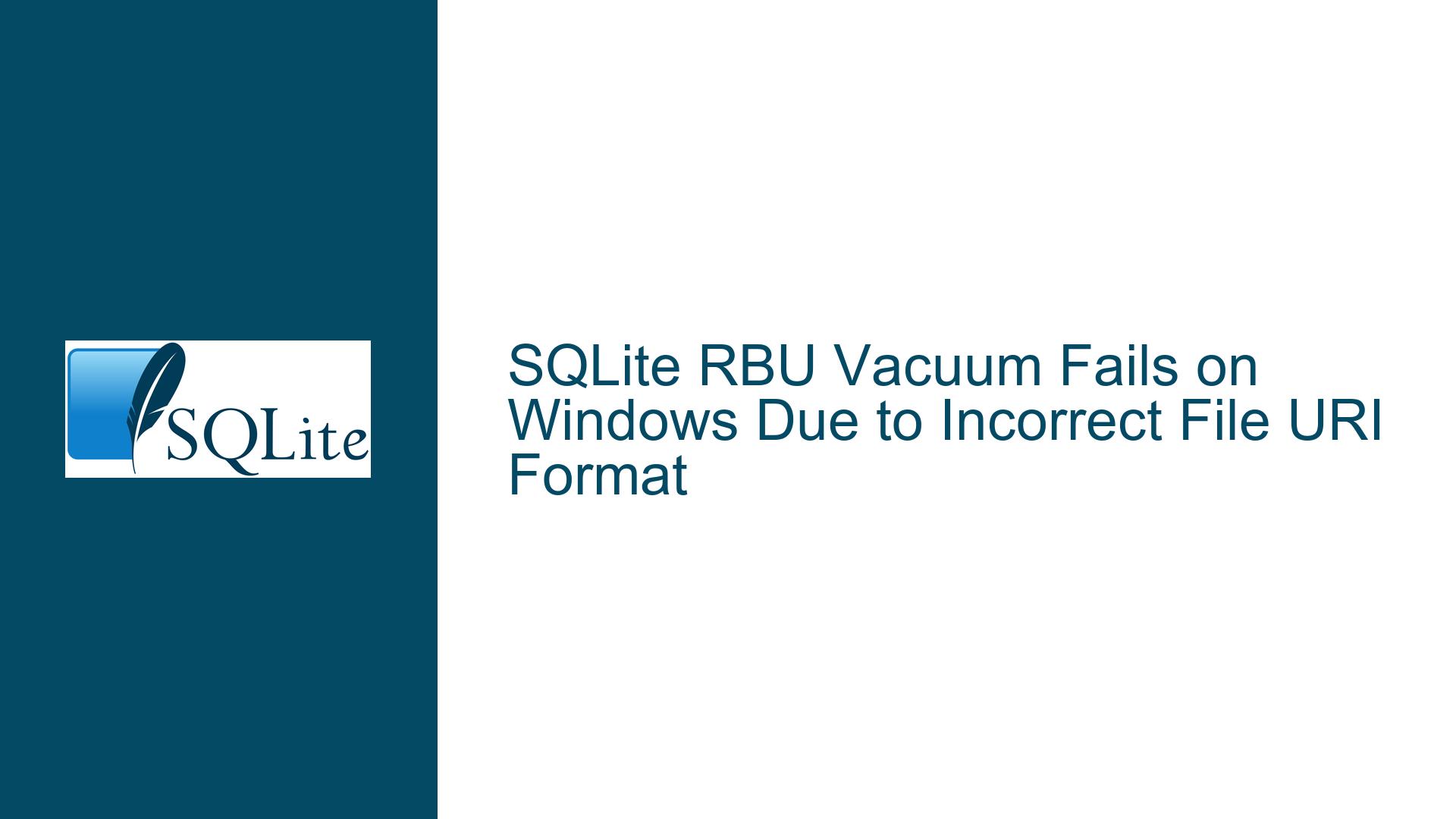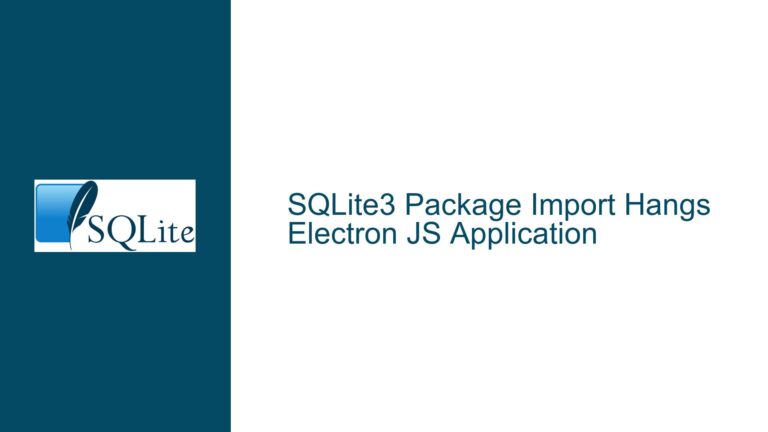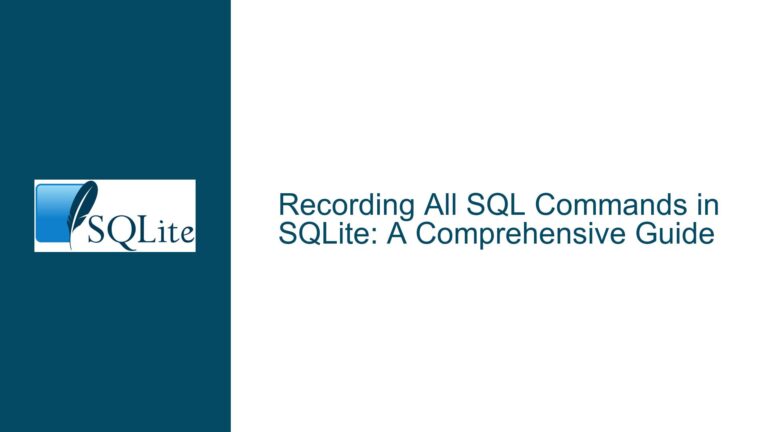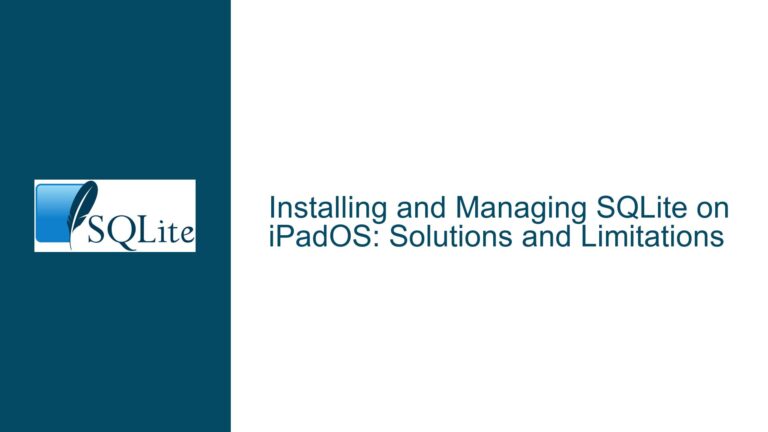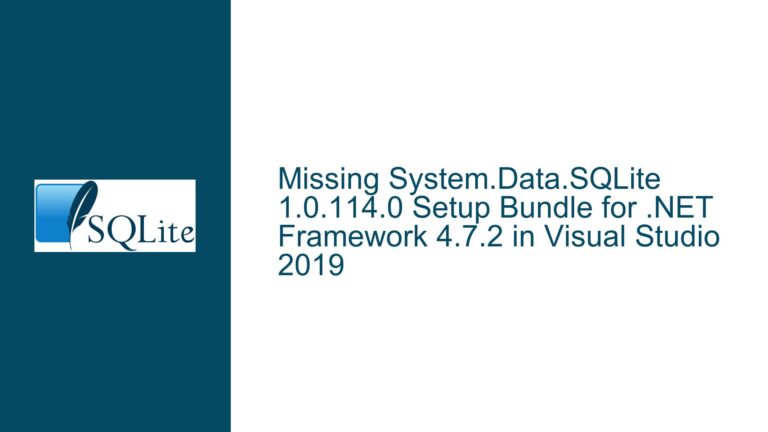SQLite RBU Vacuum Fails on Windows Due to Incorrect File URI Format
Issue Overview: sqlite3rbu_vacuum() Generates Invalid File URI for Windows Paths
The core issue revolves around the failure of the sqlite3rbu_vacuum() function when attempting to create a Resumable Bulk Update (RBU) vacuum operation on Windows systems. This failure occurs specifically when the zState parameter is set to NULL, which instructs the SQLite RBU extension to generate a temporary state database URI automatically. The error manifests as an "invalid uri authority" message, indicating a problem with the URI syntax during the internal parsing phase.
The root of the problem lies in the way the RBU extension constructs file URIs for Windows paths. When zState is NULL, the function generates a URI string with an incorrect number of slashes, violating the File URI scheme standard for Windows. Specifically, the generated URI uses file://C:\dir\file.db (two slashes), whereas the correct format requires three slashes after the file: scheme identifier: file:///C:\dir\file.db. This discrepancy causes the SQLite URI parser (sqlite3ParseUri()) to reject the URI as malformed.
The incorrect URI format disrupts the initialization of the RBU vacuum process, as SQLite relies on valid URIs to handle database file paths in cross-platform scenarios. The failure prevents the creation of the temporary state database, halting the entire operation. This issue is exclusive to Windows due to differences in how file URIs are structured compared to Unix-like systems. The problem does not affect non-Windows platforms because their file URIs do not require the same authority component handling (e.g., file:///path/to/file.db works universally for Unix paths but requires special handling for Windows drive letters).
Possible Causes: URI Authority Parsing and Platform-Specific Path Handling
1. Incorrect Slash Count in File URI Construction
The RBU extension’s internal logic for generating temporary state database URIs on Windows fails to account for the required three slashes in the file:/// scheme prefix when the hostname is omitted. The code erroneously constructs URIs with two slashes (file://C:\...), which the URI parser interprets as a non-local file with an authority component (e.g., a network resource). Since no valid authority is provided, the parser rejects the URI. This violates the File URI specification for local files, which mandates three slashes for empty authority (i.e., file:///).
2. Platform-Specific Path Normalization Logic
The RBU extension’s URI generation logic does not adequately normalize Windows drive letter paths into URI-compatible formats. Windows paths containing backslashes (\) and drive letters (e.g., C:\) require special handling to conform to the URI standard. The absence of proper escaping or conversion of backslashes to forward slashes (/) exacerbates the issue, though the immediate failure in this case is caused by the slash count mismatch rather than the directory separator character.
3. Ambiguity in Hostname Omission for Local Files
The SQLite URI parser expects URIs for local files to omit the hostname but retain the three slashes (e.g., file:///). The RBU extension’s logic incorrectly assumes that omitting the hostname allows reducing the slash count to two, which conflicts with the parser’s strict adherence to the URI standard. This mismatch highlights a broader challenge in reconciling platform-specific path conventions with URI syntax requirements.
Troubleshooting Steps, Solutions & Fixes: Correcting URI Generation and Validation
Step 1: Diagnose the URI Construction Logic
Review the RBU extension’s source code to identify where the temporary state database URI is generated. The critical code segment is in sqlite3rbu.c (line 2786 in the referenced version), where the URI string is assembled using sqlite3_mprintf("file:%s", zPath). On Windows, this produces file:C:\dir\file.db or file://C:\dir\file.db, depending on additional logic. The missing slash after file: or incorrect count of slashes after file:// is the primary culprit.
Step 2: Modify URI Generation for Windows Paths
Update the URI construction logic to explicitly include three slashes after the file: scheme for Windows paths. For example, replace:
zUri = sqlite3_mprintf("file:%s", zPath);
with platform-specific logic:
#if defined(_WIN32)
zUri = sqlite3_mprintf("file:///%s", zPath);
#else
zUri = sqlite3_mprintf("file:%s", zPath);
#endif
This ensures that Windows paths receive the required file:/// prefix. Additionally, replace backslashes with forward slashes in the URI path component to comply with URI standards, though SQLite’s parser is generally tolerant of backslashes in paths.
Step 3: Validate URI Parsing Behavior
Test the modified URI generation using SQLite’s sqlite3ParseUri() function to confirm that the corrected URI is accepted. For a Windows path C:\dir\test.db, the generated URI should be file:///C:\dir\test.db. The parser should recognize this as a valid local file URI without an authority component, allowing the RBU extension to proceed with creating the temporary state database.
Step 4: Apply Platform-Specific Conditional Compilation
Ensure that the corrected URI logic is applied only on Windows by using preprocessor directives (e.g., #if defined(_WIN32)). This prevents unintended side effects on Unix-like systems where the file:/path/to/file.db or file:///path/to/file.db formats are interchangeable.
Step 5: Backport and Regression Testing
Integrate the fix into the SQLite codebase and conduct regression tests across platforms. Verify that sqlite3rbu_vacuum() functions correctly on Windows with zState = NULL and that existing behavior remains unchanged on other operating systems. Automated tests should include URI parsing assertions and RBU vacuum operations on sample databases.
Final Solution
The resolution involves correcting the URI scheme prefix to include three slashes for Windows paths, aligning with the File URI standard. This fix was implemented in the SQLite source code via commit 77ccc8ea8a901df6, ensuring that sqlite3rbu_vacuum() generates valid URIs for local files on Windows. Developers using older SQLite versions should apply this patch or upgrade to a release containing the fix.
